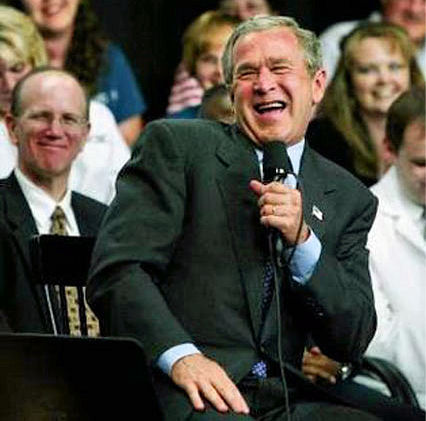
Comments by James Denselow of the Guardian regard the fun that Bush had:
guardian.co.uk, Friday 16 January 2009
Early in December before the Middle East began another round of bloodshed, President Bush gave a speech at the Brookings Institute where he summed up the legacy of his foreign policy on the Middle East. He began by explaining that the "Middle East in 2008 is a freer, more hopeful and more promising place than it was in 2001."
This is the conclusion to President Bush's personal narrative of his impact on the Middle East. The symbolic handing over of the Green Zone – the epicentre of US power in Iraq – provides the illusionary end of President Bush's "successful" attempt to bring freedom to the people of Iraq.
.
The American public has its own reasons for not liking Bush and his wars. Latest US polls suggested that 79% of Americans will not miss him after he leaves the White House. Iraq has been the second most expensive American war in history according to the Centre for Strategic and Budgetary Assessments. The deceit over WMD, the failure to square expectations from "mission accomplished" in 2003 with the bloody Iraqi civil war that followed, the number of American casualties and the subsequent controversies over veteran treatment all added up to a messy conflict that the US is ready to see end.
The largest danger for Iraq is what military commanders and diplomats term "slippage". While this refers largely to any potential reversal in the metrics of success (US troops killed, Iraqi civilians killed, oil output etc.) – recent events have highlighted the dangers of going back to square one. Indeed US attempts to empower the Iraqi military in order to calm the competing elements within society may sow the seeds of this reset. The Iraqi military's operations across Iraq over the past year have been designed to allow the state to take charge. The relative success of these operations is reflected in the emboldened premiership of Prime Minister Maliki. However, if the state (for what it's worth) becomes dependent on the military for power, what happens when the military challenges the state for power?
The new Iraq is also largely religious and tribal in nature with regular attacks at the time of key festivals – such as the 38 civilians killed on Ashura or other outbreaks of violence when tribal diplomacy fails (such as the recent story about 23 people killed in a tribal dispute).
At his final press conference on Monday President Bush said that he and his administration "had fun", but for the millions of displaced Iraqis, the thousands of wounded, those imprisoned without trial and those who live in fear of violent death there is no saying goodbye to the Iraq tragedy.




No comments:
Post a Comment